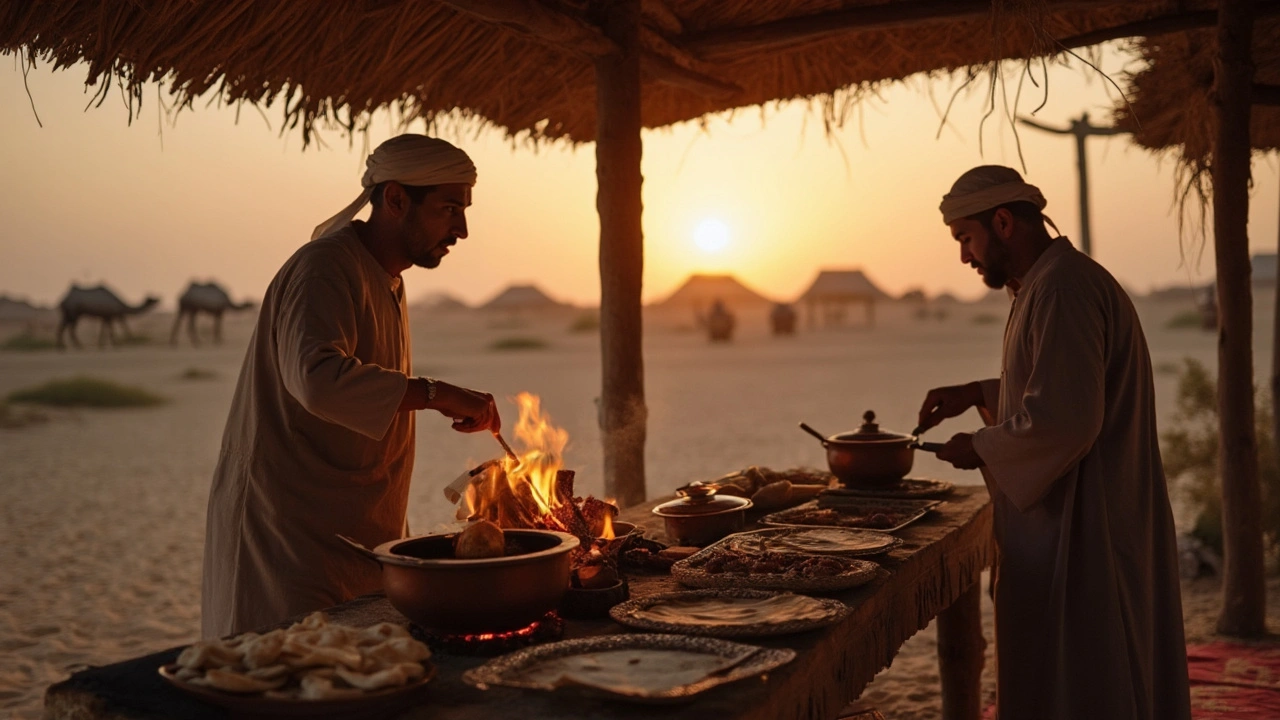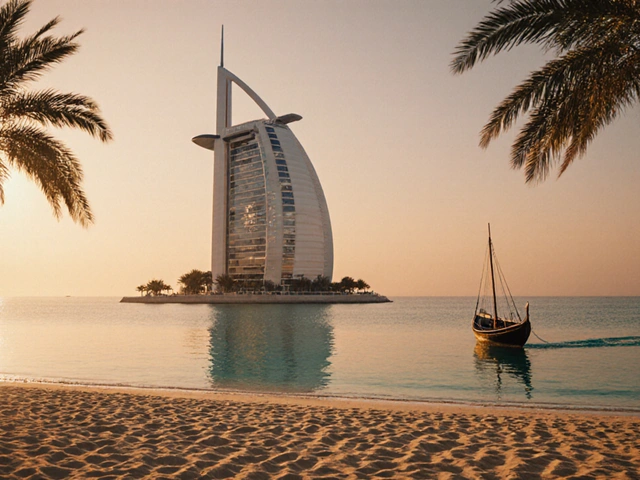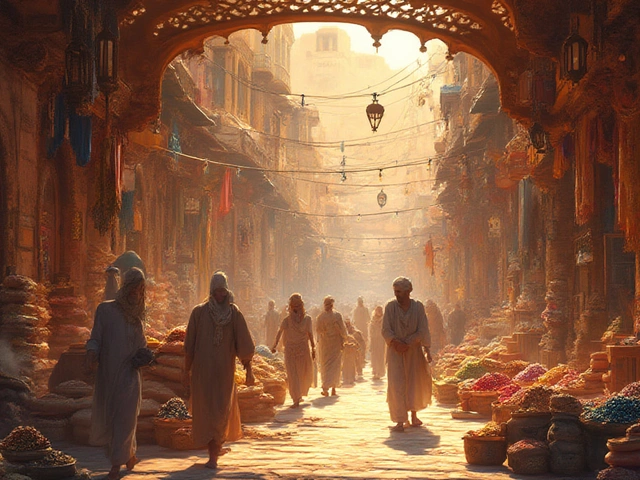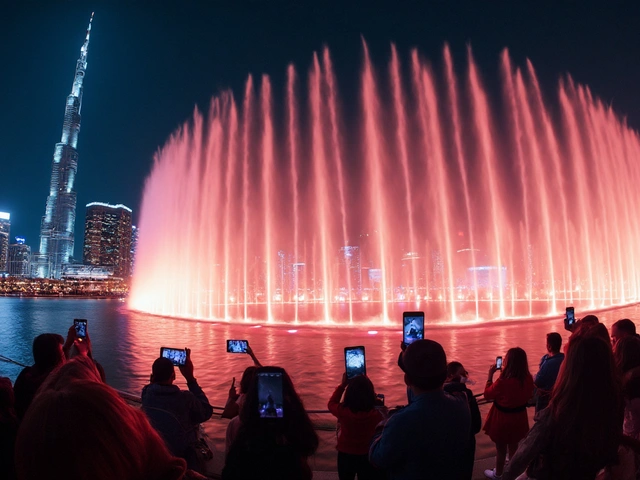Forget boring sandwiches or generic buffets—food on a Dubai desert safari is full-on flavor, served up with a good dose of local spirit. When you book a safari through outfits like Platinum Heritage or Arabian Adventures, you’re not just paying for dune bashing and falcon shows. Dinner in the desert is its own headline act, pulling inspiration straight from Bedouin fireside cooking and the kitchens of old Dubai.
There’s real care behind the camp menus; you’ll spot plenty of Emirati classics alongside Arabic staples. Think lamb ouzi that falls off the bone, balaleet sweet with saffron, and chewy fresh khubz bread straight from the tanoor oven. You can sample these dishes while sitting on carpets under a starlit sky just minutes from Dubai’s glass towers. Plus, some safaris offer upgraded dining—want organic ingredients, vegan twists, or fancy shisha pairings? Just ask. There's a lot more choice than most first-timers expect, and you won't go hungry, even if you have dietary needs.
- A True Emirati Welcome: Dining in the Desert
- From Camel Kebab to Luqaimat: What’s Actually on the Plate?
- The Experience Beyond Food: Traditions, Setup, and Etiquette
- Pro Tips: Making the Most of Your Gastronomic Safari Night
A True Emirati Welcome: Dining in the Desert
Right after your 4x4 rolls to a stop at a Dubai desert camp, you’ll notice the difference. There's no rush to the food—hospitality is the focus here, and it starts with a small gesture: Arabic coffee, or gahwa, poured into tiny cups from a traditional dallah. You’ll usually get some dates with your coffee too, just like locals do when welcoming guests at home or in the majlis. This isn’t just for show; it’s a genuine tradition still practiced across the UAE.
Once you’re settled, it’s time to dig into the main spread. Most well-rated companies, including Dubai desert safari specialists like Platinum Heritage and Arabian Adventures, set up meals buffet-style, but with real attention to culture. Picture aromatic rice, chicken machboos, camel kebabs, and smoky lamb ouzi. The bread? That’s khubz hot from the clay oven, baked right in the camp. You’ll often see the cook slapping the dough onto the tannour walls, letting you snap a photo before you tear off a warm piece.
The vibe is relaxed. You sit cross-legged on carpets or low cushioned benches, eating with your hands if you want. And if you aren’t sure about etiquette, here’s a friendly tip: use your right hand for food, just as families in the UAE do. Hosts encourage you to try a bit of everything, and seconds are always welcome.
Here’s how a typical Dubai desert dining experience stacks up compared to a standard city restaurant meal:
| Desert Dining | City Restaurant |
|---|---|
| Shared on carpets & open-air | Tables & indoor seating |
| Fresh-baked bread in front of you | Bread usually pre-made |
| Arabic coffee and dates on arrival | Breadsticks or appetizers |
| Interactive: see food grilled or baked | Food comes plated from the kitchen |
| Traditional Bedouin service & stories | Standard waiter service |
One thing regulars swear by: arrive hungry. The food is prepared for sharing, and if you show interest, hosts love telling you what makes each dish special. Don’t be shy about asking questions; you might even get invited to watch the bread or grill prep for a few minutes. And for the foodies—yes, they accommodate vegetarians and special diets, just mention it when you book.
From Camel Kebab to Luqaimat: What’s Actually on the Plate?
If you’re expecting just hummus and burgers out in the desert, you’re going to be surprised. Food on a Dubai desert safari is all about offering a real taste of local flavors, mixing Emirati tradition and Middle Eastern favorites. Let’s break down what actually lands on your plate at most safari camps, and which dishes you shouldn’t miss.
One thing that makes the experience unique is the use of old-school cooking methods, with meats slow-roasted underground in a zarb or cooked over open flames. Here’s what you’ll typically find at the buffet:
- Lamb Ouzi: Aromatic rice loaded with raisins, nuts, and fork-tender spiced lamb. Look for it at nearly every dinner station—it’s a crowd favorite and a feast centerpiece.
- Camel Kebab: Not always on the menu, but still a highlight if offered. The meat is surprisingly lean and slightly sweet. Platinum Heritage and a few other premium operators feature camel dishes for guests who want to taste something truly local.
- Chicken Machboos: Think of it as the Emirati answer to biryani—spiced chicken with fragrant rice and veggies. Comfort food, done right.
- Balaleet: Sweet-and-savory egg noodles, often topped with saffron and pistachios. Usually served at breakfast, but you might spot it as part of the evening buffet too.
- Khubz: Fresh flatbread baked in a tanoor oven. Most camps have a designated baker flipping discs of dough right in front of you. Tear it up and use it to scoop anything.
- Mezze: You’ll see classic dips like hummus, moutabal (smoky aubergine), and tabbouleh salad, perfect for starting your meal.
- Luqaimat: These little golden dough balls are deep-fried and soaked in date syrup. Have them for dessert, but they disappear fast, so don’t wait.
Worried about options and special food needs? Most desert safari operators in Dubai clearly label vegetarian, vegan, and gluten-free items. Just tell the staff—they’re used to helping guests with allergies or requirements.
Want a snapshot of the most popular dishes and their ingredients? Here’s a straight-up breakdown:
| Dish | Main Ingredients | Typical Serving Style |
|---|---|---|
| Lamb Ouzi | Lamb, spiced rice, nuts, raisins | Main, buffet or plated |
| Camel Kebab | Camel meat, spices | Grilled, usually skewers |
| Chicken Machboos | Chicken, rice, saffron, cardamom | Main, communal platter |
| Luqaimat | Flour, yeast, cardamom, date syrup | Dessert, self-serve with syrup |
| Khubz | Flour, water, salt | Baked fresh, served warm |
| Mezze | Hummus, moutabal, salads | Starters or sides |
You’ll notice that drinks usually include Arabic coffee (gahwa) and sweet tea on tap. Skip the alcohol; it’s not typical at many desert camps, especially those focused on authenticity, although some tourist-focused venues do serve it. Pro tip: try the gahwa with dates—it’s the real way locals welcome guests.
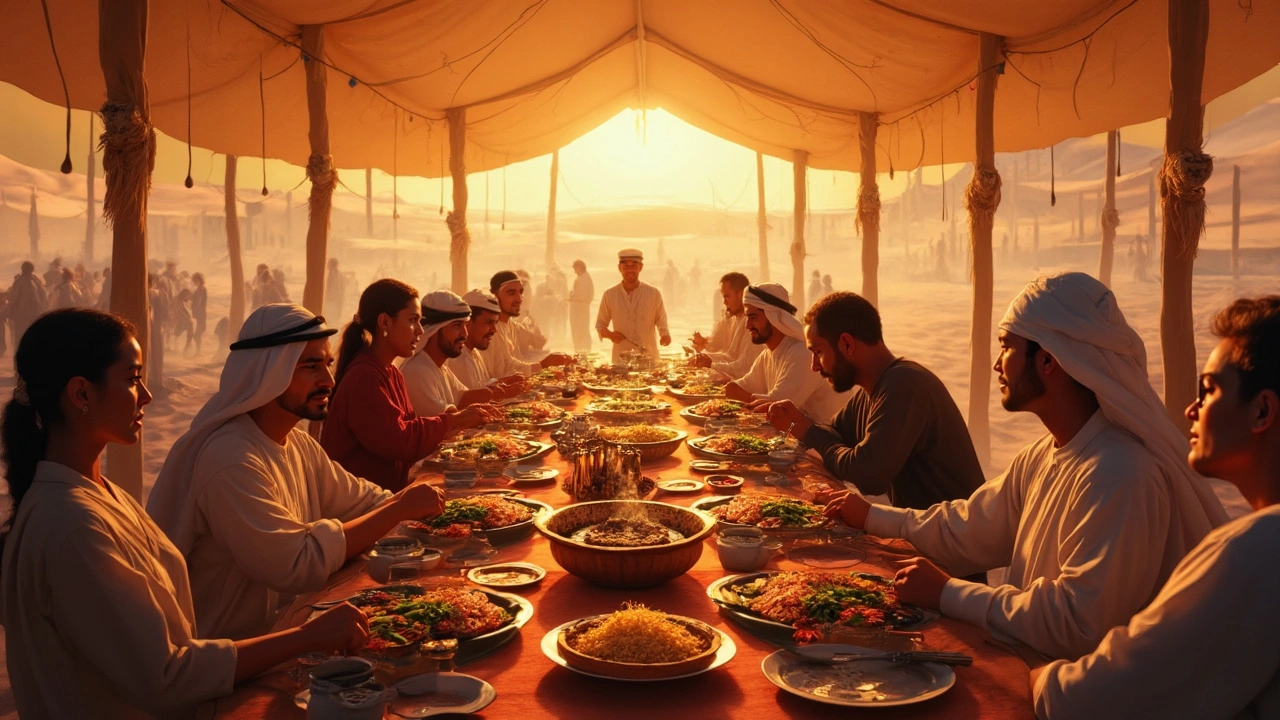
The Experience Beyond Food: Traditions, Setup, and Etiquette
Food in the desert is only half the story. What makes a Dubai desert safari meal unforgettable is everything that happens around the table—starting from the way camps are set up to the small customs you’ll notice during dinner. Dubai’s best safari operators model their dining spots after traditional Bedouin gatherings. Picture low tables, thick carpets, and cushions under wide open tents. Some camps, like those used by Heritage Express, center the table around a live fire—so the scent of grilling flows right where you’re sitting.
There’s a rhythm to the evening. As sunset hits, guests are usually welcomed with gahwa (Arabic coffee) and fresh dates. That’s not random hospitality; in Emirati culture, serving dates and gahwa is a genuine sign of respect and inclusion. Some hosts even use dallahs—the tall coffee pots that you’ll see in Dubai’s museums and on its coins. Those first sips set a friendly tone and break the ice with other diners.
- Dress code: Go for breezy, modest clothes. Leave short shorts and spaghetti straps for the beach. Many locals and expats stick with light long sleeves and comfy pants, which helps with both etiquette and sand protection.
- Shoes: You’ll be on carpets or sand, so easy-off footwear works best. Many folks go barefoot once seated.
- Eating style: At many camps, you eat with your right hand (the traditional way). Utensils are almost always available, but give the hand-to-mouth style a shot if you’re up for it. Servers usually offer sanitizer or napkins before you eat.
Cultural shows—like a Tanoura dancer or oud music—often fill the time between courses. These performances showcase traditions from across the UAE and the region. If you’re lucky, there’s a falcon demonstration—a staple of local heritage, not just a tourist gimmick. You’ll spot hookah lounges too, but don’t worry if that’s not your thing; there’s no pressure to join in.
| Desert Dining Etiquette | Why It Matters in Dubai |
|---|---|
| Use your right hand to eat and pass food | Respects local custom and avoids offense |
| Accept coffee or tea with your right hand | Shows you’re joining the moment |
| Ask before taking photos, especially of performers | Personal privacy is valued here |
| Wait for hosts to signal when eating starts | Part of group-friendly hospitality |
One thing to keep in mind: in Ramadan, eating and serving times follow sunset (iftar), and the energy around the meal is even more welcoming. If you’re at a safari in summer, expect later dinner hours, and maybe hear a few extra stories about the holy month and its traditions.
Pro Tips: Making the Most of Your Gastronomic Safari Night
If you want your Dubai desert safari feast to be as memorable as the sandboarding, a little prep goes a long way. Here’s everything you should know—straight from regulars, chefs, and guides who live for these nights under the stars.
- Arrive hungry. The dinner spread on a top-tier Dubai desert safari easily rivals city restaurants. Skipping lunch? Not a bad plan. Plates get piled high, and you’ll want room for fresh mezze, ouzi, and desserts like luqaimat.
- Dress for comfort and the evening chill. Desert nights cool off, sometimes dipping below 20°C after sunset—even in April. Bring a light jumper or scarf you can toss on between bites. You’ll be sitting on cushions, so comfy shoes or sandals are better than heels or dress shoes.
- Timing matters. Book your safari during Ramadan or right after Eid for the most festive dining, when live stations may include extra Emirati dishes and spiced teas. December to March is cooler—perfect for lingering over dinner outdoors.
- Check your safari style. Premium camps like Al Maha’s Bedouin experience or Platinum Heritage’s conservation tours serve up local, organic ingredients. Some camps cater to halal, vegan, or gluten-free diets—just mention this when booking. The best spots like Sonara Camp even serve plant-based camel burgers.
- Eat—and watch. Keep an eye on how dishes like khubz are cooked in the tanoor. A lot of camps let you interact with cooks; some will even invite you to help knead or flip bread.
- Don’t skip the coffee and dates. Gahwa (Arabic coffee) and dates are more than snacks—they’re central to Emirati hospitality. Servers usually go table to table at the start of dinner, offering small pours and sweets.
Want another inside scoop?
“Guests are always surprised by how generous the portions are and how authentic the flavors feel, even in a tourist setting. We take pride in sharing our heritage with every plate,” says Chef Saeed Al Haj, Executive Chef at a leading Dubai desert camp.
Bring a small flashlight or use your phone to scope out the buffet if it’s really dark—some camps keep lighting low for the mood. And snap photos before you eat, because sand, lanterns, and bright spices look just as good as they taste.
Lastly, tip the cooks and servers if the service is great. In Dubai, a few dirhams go a long way to show appreciation for a real desert culinary adventure.

